AFL 2021: Why the Demons will record a Covid loss on balance sheet, even if they win the flag
Financially for AFL clubs this season is like a game of snakes and ladders. Landing in the wrong spot fixture-wise could cost a club millions, even with a premiership.
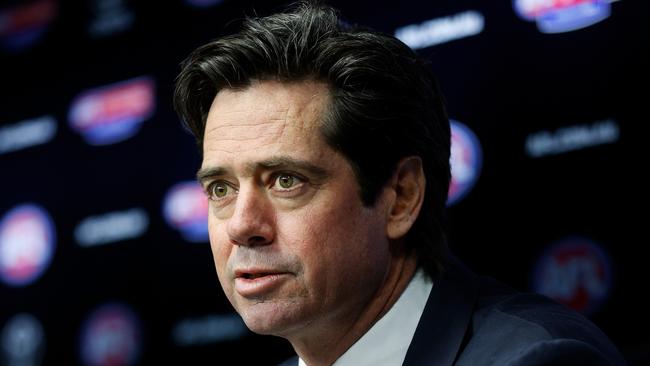
AFL
Don't miss out on the headlines from AFL. Followed categories will be added to My News.
The AFL’s top two clubs sit towards opposite ends of the coronavirus cash ladder as Melbourne braces for more than $3.5 million to be ripped from its balance sheet.
The Demons kissed $2.5 million goodbye in two weeks when their Alice Springs and Queen’s Birthday goldmine games were moved to Sydney during Victoria’s fourth lockdown in June.
Lockdown No. 5 has now started with Melbourne hosting Hawthorn last week and, after a fixture change, Western Bulldogs this week at an empty MCG.
In a normal season those games would be worth $400,000 (Hawthorn) and $750,000 (Dogs).
The Demons are debt-free and next year’s $20 million sale of the Bentleigh Club will set up the club for life through the creation of a future fund.
Watch The 2021 Toyota AFL Premiership Season Live & On-Demand on Kayo. New to Kayo? Try 14-Days Free Now >
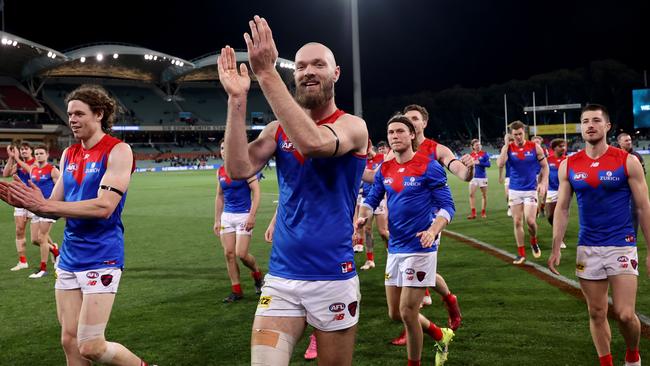
But the rotten timing of home games in 2021 means the Demons will record a loss even if their 57-year premiership drought ends.
Meanwhile, the second-placed Dogs are on track to post another pandemic profit through the sheer luck of the draw.
Their only virus-affected home game was playing Melbourne at an empty Marvel Stadium in May, which cost $300,000.
The AFL’s decision to bring forward the return top-of-the-table blockbuster to Saturday night was another commercial blow for the Dees and win for the Dogs, because their lucrative home game in Ballarat — originally scheduled for Sunday against Adelaide — could now still go ahead.
It’s understood the rural match, is worth roughly $500,000.
“We’re still hoping to make a profit,” Dogs boss Ameet Bains said.
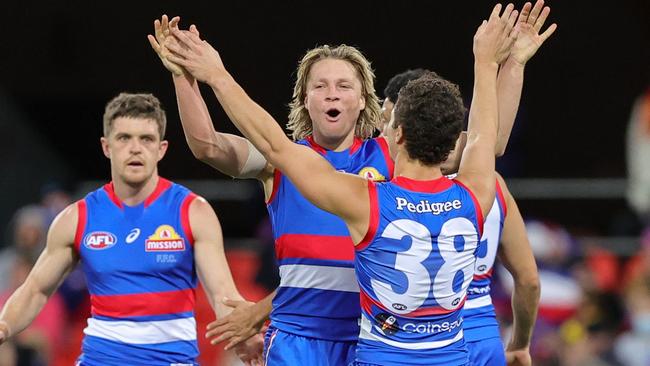
“For us the first time around (hosting the Dees at an empty venue) was a significant commercial hit, so we’re feeling for Melbourne that they’re faced with the same situation this week.
“The one silver lining is it means our Ballarat home game will still have an opportunity to be played in the last month of the season, and that’s a really important game for us commercially.”
The Bulldogs were on the road for all of June, when fans were banned from attending games in Melbourne, as they played two games in Perth, one in Geelong and had a bye.
Victoria then reopened in time for Bulldogs home games in rounds 16-17 before re-entering lockdown last week, which has started with away games against Gold Coast (last week) and now Melbourne.
Bains warned it was too early to breathe a sigh of relief over the fixture fortune.
“We still have Essendon at home and Port Adelaide at home,” he said.
“So the situation is still OK for us, but if we got to the end of the home-and-away season and we weren’t able to have fans at those remaining games it would be a different story.”
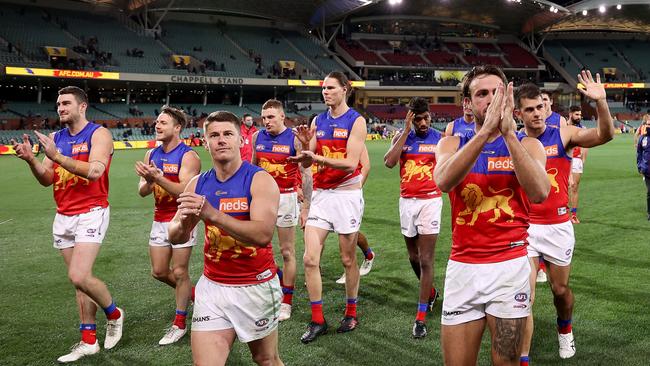
Adelaide football director Mark Ricciuto warned the AFL’s determination to press ahead with the season was coming at a cost for clubs.
The Crows will host Hawthorn at an empty Marvel Stadium on Saturday night.
Wealthy West Coast’s home games are so lucrative it dropped $6 million by hosting Fremantle and the Dogs in front of no spectators.
On June 27 the Western Australian government decided to lock Eagles fans out just three hours before the first bounce after a single Covid case was detected.
But in further proof this season is nothing more than financial lotto, Brisbane Lions have only lost $100,000 for the season.
That came when their home game against St Kilda was played in front of 9075 fans at Metricon Stadium.
Geelong hosted Essendon, Western Bulldogs and West Coast in front of a combined 22,162 across three restricted games at GMHBA Stadium.
When just 6583 were allowed in against the Dogs the Cats lost $500,000.
Revealed: $6m weekly Covid black hole to keep season alive
Footy’s Covid crisis is costing the AFL up to $6 million a week as league officials scramble to keep the 2021 season alive.
As the AFL’s logistical nightmare surrounding its fixture rolled on with Adelaide and Port Adelaide flying to Melbourne after a dramatic day of delicate negotiations, club chiefs on Tuesday were updated on the growing financial strain being placed on the game.
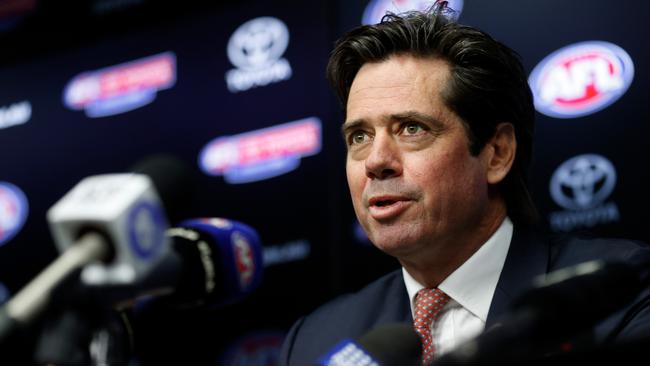
The $5 million-to-$6 million-a-week bill does not include other industry losses caused by the current ban on Victorian crowds, including lost gate takings and other match-day revenue — crucial to the bottom line of the competition’s 18 clubs.
A meeting of all club chief executives and league bosses scheduled for Nagambie was instead held virtually as the AFL grapples with the latest multistate shutdowns.
South Australia has joined Victoria and New South Wales in lockdown, due to Covid-19 outbreaks.
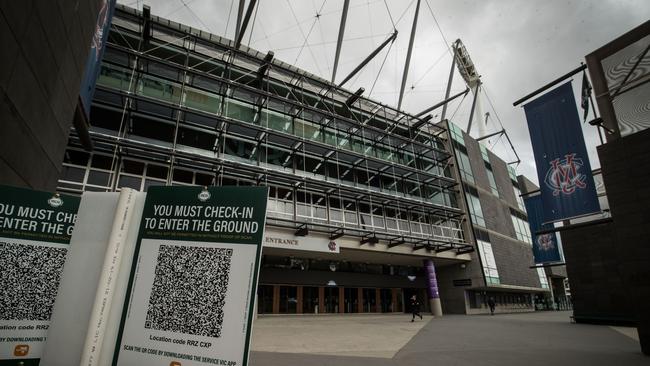
The costs of flying teams around the country, their accommodation and a likely quarantine hub for the families of Sydney and GWS players and staff are negligible compared to the doomsday scenario of games being cancelled which would see the lucrative TV rights tap turned off.
The $400-million-plus-per-year media rights deal accounts for about 60 per cent of the AFL’s total revenue, which is why the league is determined to play on — even without crowds.
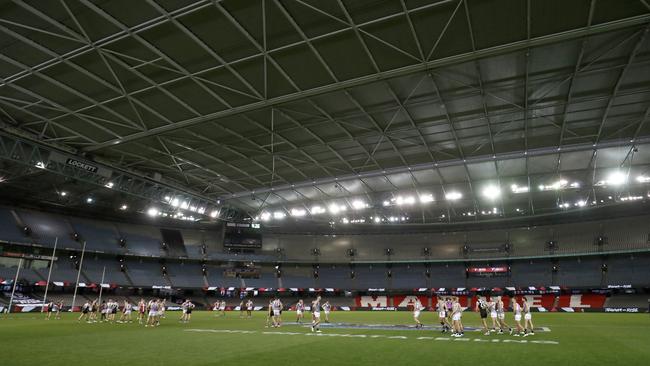
Clubs were told on Tuesday a major focus in the short-to-medium term would be the health and wellbeing of the players and their families, club staffers and industry workers.
They also had discussions about the look of next year’s football department soft cap with plans for exemptions around medical and welfare expenditure to lessen the impact of last year’s crippling 30 per cent reduction.
Talks about a plan to have part of senior coaches’ contracts outside the $6.2 million soft cap — which is down from $9.7 million in 2019 — have not been resolved.
The fate of the cash-cow finals series and prized Grand Final remains unknown.
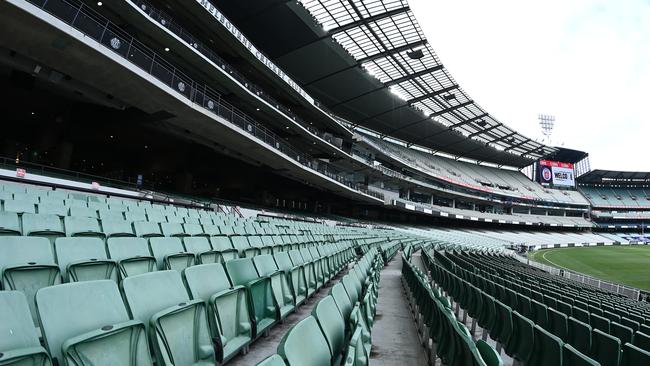
Health officials have expressed alarm about how the highly contagious Delta strain led to infections at the MCG at the Carlton-Geelong game on July 10 and at the Wallabies-France rugby test at AAMI Park on July 13.
There are fears there could be stricter limits on fans for the rest of the AFL season with no certainty on when crowds will return.
The complications the AFL is dealing with now are even more complicated than last season when there was an 82-day shutdown and the loss of five rounds.
The establishment of hubs in Queensland last year allowed the season to stabilise and ultimately finish with a Grand Final played at the Gabba in front of a full house.
More Coverage
Originally published as AFL 2021: Why the Demons will record a Covid loss on balance sheet, even if they win the flag




